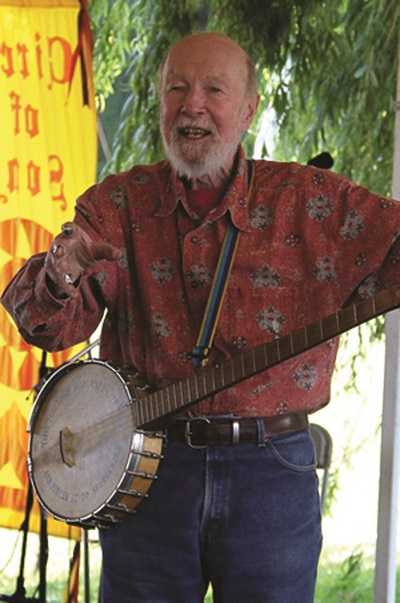Pete Seeger was considered a beacon of hope throughout several decades of American struggles, whether through his music or his political activism, he touched countless lives: one such life is that of David Brahinsky, Professor of Philosophy and Comparative Religion at Bucks County Community College. Best known for his songs “Turn Turn Turn”, “Where Have all the Flowers Gone” and “If I Had a Hammer”, Seeger leaves behind a great legacy. In the spirit of folk music, Seeger encouraged participation in everything he did. “We’ve all got to be involved in trying to put this world together,” Seeger once said. Seeger showed us that music could be a vehicle for social change. Brahinsky prescribes that “Music reaches people both emotionally and intellectually. If you want to change the world, well music, it affects people. Music has been used to affect the universe, in nearly all cultures and religions, throughout time, around the world. It affects the intellect, it affects emotions, it affects the body by getting people moving—it affects the whole person. But music alone won’t change the world and Pete knew that.” The philosophy professor recalls a story of the closest he ever came to meeting Seeger. One day, Brahinsky and his friend Leroy Lesame were on their way to a school in Brooklyn to see Seeger perform. Brahinsky explained, “Leroy, a fellow folk singer, was a friend of Pete’s, and here we find Toshi Seeger, Pete’s wife, on the side of the road. So, we pull over and Leroy says to her, ‘Toshi, what’s a matter?’ Well, she had a flat tire, so we fixed it for her. After we were done, we just continued on our way to see Pete sing.” When not teaching at Bucks, Brahinsky feeds his passion for folk music through singing, songwriting, and playing his guitar – either as solo performances or with The Roosevelt String Band. Folk music has been a part of his life since he was a young boy. At age 10, he started out by learning to play the ukulele. Brahinsky says he can’t help but incorporate his love for music in the classroom. In the last class at the end of each semester, he performs a few songs for his students, usually some Pete Seeger, something relevant to the theme of the class. “It’s teaching to the emotional intelligence, as well as the intellectual,” Brahinsky explains. “It is music with a message and it promotes social change.” Brahinsky describes what set Seeger apart from everyone else. He explained that Seeger “never sold out to commercial interests. He stood up for the poor, the disadvantaged, for women. He fought for civil rights, and the anti-war movement. He sang about human rights, justice, and loving the human race. And for this reason, my favorite song of his is ‘My Rainbow Race.’” Never complacent to social issues, his efforts went beyond that of the musical stage and on to the political stage where he rallied and campaigned in the face of adversity, for human rights and the environment. He protested for worker rights in the 1940’s and 50’s, civil rights and the anti-war movement in the 1960’s and 70’s, and, most recently Occupy Wall Street. One of his most inspiring achievements, some might say, was the founding of Hudson River Sloop Clearwater, Inc., an organization dedicated to preserving the Hudson River and notable for its efforts in the passing of the Clean Water Act. In 1994, when Seeger was awarded the Kennedy Center Honors, Bill Clinton said that “some artists make musical history – Pete Seeger made history with his music.” On Jan 27, 2014, Pete Seeger died in his sleep at the age of 94, pushing the American people to mourning the spectacular musician, humanitarian and activist. Brahinsky has plans to host a show at the college in mid-April. The show will feature songs by “Pete Seeger and the Weavers, songs of social justice, anti-war, and just plain fun.” “I sing Pete’s songs because I agree with Pete.” Brahinsky adds, “Pete was always Pete, no matter where he was or what he was doing. On stage or with his friends, he was always himself. He was what some called a ‘Mensch’, a real person, one of the best.” For more information about the concert in April, contact Professor David Brahinsky at [email protected] or keep an eye out for posters (coming soon) around campus.


